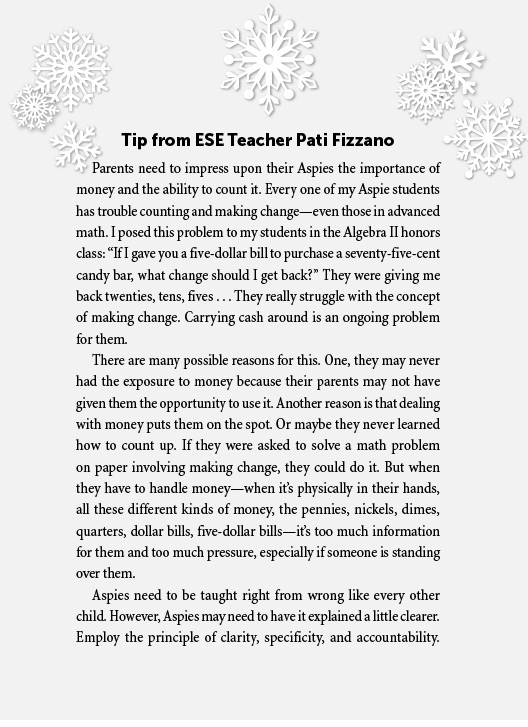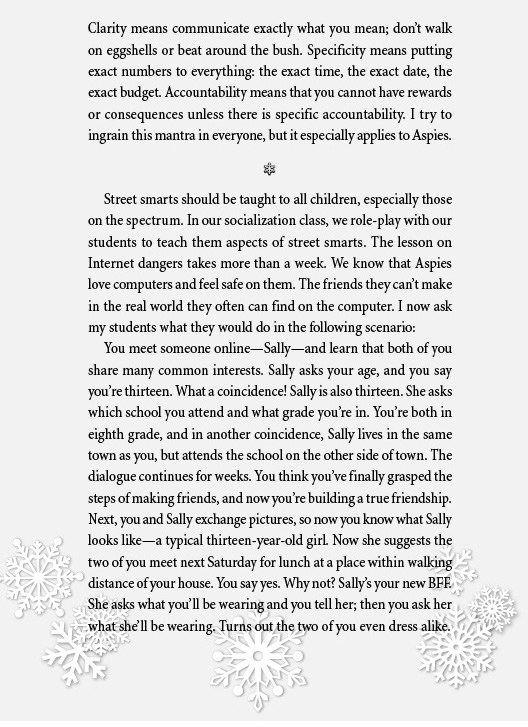
Being street smart comes from
experience. It means you’ve learned
how to take what has happened to
you, good or bad, and learn
to improve from it.
—Scott Berkun
Helpful Hint: The ways of the world don’t come naturally to Aspies. They lack street smarts and most survival instincts. They can’t tell the good guys from the bad guys. They can be quite gullible and easily swayed (except, of course, by their parents). To protect themselves, they’ll need to be taught the logic of day-to-day situations in a way their brain circuitry can process. Teaching and insisting on ironclad rules will be helpful, because then they won’t have any decisions to make. Providing a safe mechanism for gaining experience is also a key tactic.
Principle: Aspies lack the neurotypical’s instincts for self-preservation and survival, as well as their other common-sense tendencies. But they must be trained to survive in the world as it is. Your job is to teach them the logic (or at least the mechanics) of the actions that don’t come naturally to them, particularly street smarts.
Sure, it’s generalizing to say that all Aspies are gullible. After all, Aspies’ brains are all different, and your Aspie may have a healthy dose of common sense. But many don’t. If the shoe fits, wear it. On “the street,” the downside of making a mistake is huge.
Following is a tragic example of what can happen on the streets. Andrew Young, a forty-year-old man with Asperger’s syndrome, spoke several languages, but, according to his family, he had the social skills of a fourteen-year-old. Andrew’s friends described him as someone who “wouldn’t hurt a fly.”
On November 6, 2013, Andrew was walking on the sidewalk in Bournemouth, England, when a bicyclist rode very close to him. He told the bicyclist that riding on the sidewalk was dangerous. It’s not that what he said was incorrect, but, because he lacked social skills, the comment came off as sounding arrogant and rude, which apparently didn’t sit well with the cyclist and his friends. The cyclist rode away, but a cohort walking behind him sucker-punched the Aspie flush in the face. Young collapsed and hit his head on the pavement. He died the following day at a hospital from his head injury, his mother at his side. The man who threw the punch on the gentle Aspie pleaded guilty to manslaughter and received a prison term of four and a half years.
This demonstrates the importance of giving the Aspie ironclad rules. If they have a rule to fall back on, they don’t have to figure out each specific situation. (Keep in mind that teaching Aspies can be frustrating; they’ll want to focus on the specific example, while you’re interested in establishing a general, easy-to-follow rule they can apply to many situations.) Rules reduce the Aspie’s daily anxiety level. Once a rule is set in stone, it gives the Aspie a trusted Aspertool to rely on when a situation arises.
One rule might be that if you’re out in public and you need help, go to someone wearing a uniform or someone at their job—for example, a store employee at the mall. Aspies must be told, “Never go to a stranger for help!” Similarly, if a stranger comes up to them and asks for help, they should walk away. Strangers do not approach children for assistance. As with many things, the lines get blurred as your Aspie journeys toward adulthood.
But the street smart rules you try to hand down to your Aspie don’t apply to what to do just when he’s outside. Plenty of bad things can happen to anyone inside their homes.

Imagine you’re an Aspie. The phone rings and you answer it. The man with a gentle voice on the other end identifies himself as Sgt. Smith of the local police department and says that you have to give him your Social Security number for their files. Had you not been trained, you’d have gladly given this nice-sounding man your Social Security number. After all, he’s a policeman, a recognized authority figure, and he sounds kind.
But you have been trained! You know the rule is that you are never ever to give out your SSN or any confidential information over the phone or on the Internet without checking with a trusted, caring person, such as a parent or your coach. If asked for such information, you simply say, “Not at this time. I have to check with my mom,” then call someone you trust and ask for advice. If you follow this rule, you can’t be verbally bullied or manipulated. You’ll be safe. The rule makes a call like this a non-issue instead of an anxiety-laden stressful situation. You didn’t even have to factor in if the caller was a friend or the phone company or a collection agency.
The Internet provides challenges for many of us. Its many phishing scams try to trick you into clicking on a fraudulent link, resulting in malware viruses, or malicious e-mails hope to fool you into giving up your confidential information. One simple rule (and this applies to every Internet user) is never to click on such a link, always to go to the main website of the alleged company that sent you such an e-mail, or to have somebody to go for advice. It is easier to have a rule than to have to figure out each particular situation.
Another rule might be that your Aspie is not allowed to use a credit card on the Internet. The problem with setting this rule is that many Aspies prefer shopping online because it’s less stressful than getting to a store and then dealing with a clerk and buying the merchandise there. But it’s an easy-to-follow blanket rule that could save a lot of grief. One option you might offer your Aspie is to use prepaid gift cards online. Or maybe the rule might start out as no unsupervised time on the Internet and then evolve into something more flexible. (The Internet poses unique problems for Aspies. For instance, many think they can make friends on the Internet, and if for some reason they need to “tune them off,” they can easily do so. But that’s not always the case.)
ACTION PLAN: Don’t put your Aspie in a bubble. Teach him everything he needs to know. Don’t hide anything from him. But create clear and specific rules to protect your Aspie in certain situations, and then strictly enforce those rules. Safety while gaining experience is the goal.
Make sure your Aspie has someone besides you to go to for advice—a trusted individual or group. Teach him the basic “why” of the actions he is to take, using logic that his brain circuitry can follow. This will substitute for his missing instincts. You can even try to teach him street smarts, but keep in mind you’ll have to deal with your Aspie’s unique brain circuitry.



